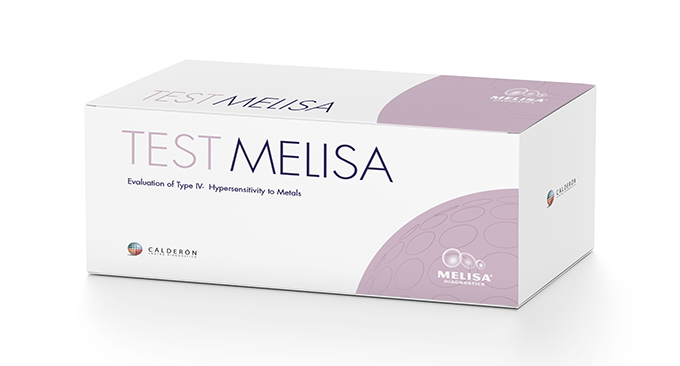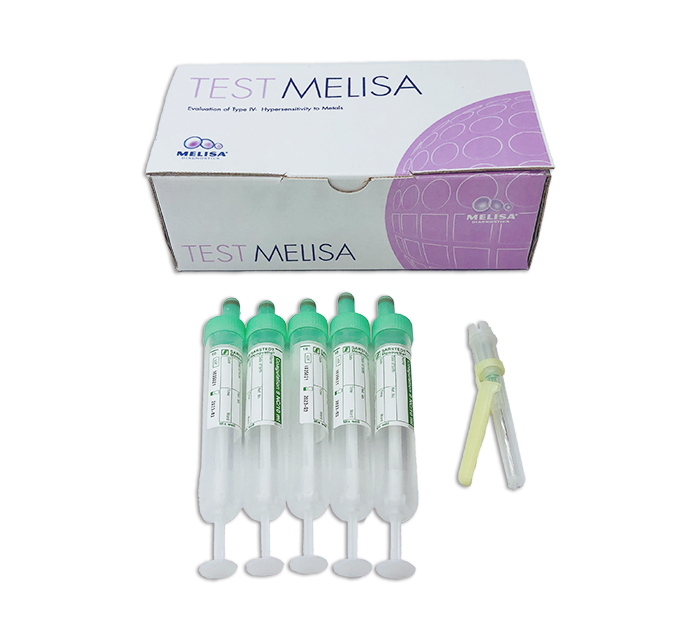
What does the melisa test consist of?
TEST MELISA comes from the acronym: Memory Lymphocyte Immunostimulation Assay. TYPE OF SAMPLE: Blood
The technique consists of a cell culture of lymphocytes in the presence of metals, which assesses the degree of lymphocyte proliferation.
Type I, II, and III hypersensitivities produce lymphocyte activation, (either IgG or IgE), and are therefore measured using traditional antibody counting techniques.
Type IV hypersensitivities only produce an increase in lymphocytes numbers, so the methodology used in the MELISA test is currently the only viable laboratory technique for counting them.
MELISA detects the immune reaction against metals. BIt determines reactivity and intensity of reaction to each metal tested.
When a hypersensitivity process takes place, the sole and minimum contact of that organism with the metal produces an allergic and pathological reaction. This is the reaction measured by MELISA Test, thus detecting which metals make the body react, after the first contact.


Warranties – melisa organization
MELISA is the only scientifically validated blood test to diagnose type IV hypersensitivity.
It is carried out under a license granted by the Organization MELISA.
Currently, only 4 laboratories authorized by this organization analyze the test (Germany, Switzerland, Israel, and in Spain, Centro Diagnóstico Calderón), which has been analyzing it since 2014.
Multiple publications support the efficacy and clinical utility of the test MELISA
Type panels
The metals to be analyzed can be included in standard panels, or in personalized panels according to the patient’s exposure to specific metals, their clinical history and their symptoms.
Basic panel: Ni, MeHg, Al, As, TiO2
Autism panel: Al, Hg, Mel-Hg, Ni, Pb, Timerosal
Basic amalgam panel: Cu, Hg, Ni, Ag y Sn
Amalgam panel + Root implats: Al, Be, Cd, Cr, Cu, Au, In, Hg, Ir, Metil-Hg, Mo, Ni, Pd, Fenil-Hg, Pt, Ag, Timerosal, Sn, TiO2, Zr
Complete amalgam panel: Cu, Ga, Au, In, Hg, Ir, Ni, Pd, Pt, Ag
Titanium implants panel: Al, Ni, TiO2, Ti (SO4)2
Tailored panel: Selection of specific metals adapted to the patient
Metals analyzed
From a long list, the most frequently analyzed metals are the following:
Aluminium (Al)
Antimony (Sb)
Arsenic (As)
Barium (Ba)
Beryllium (Be)
Bismuth (Bi)
Cadmium (Cd)
Chrome (Cr)
Zirconium (Zr)
Cobalt (Co)
Copper (Cu)
Titanium Dioxide (TiO2)
Tin (Sn)
Ethylmercury (Etil-Hg)
Phenyl Mercury (Fenil-Hg)
Gallium (Ga)
Indian (In)
Iridium (Ir)
Manganese (Mn)
Inorganic Mercury (Hg)
Methylmercury (Metil-Hg)
Molybdenum (Mo)
Nickel (Ni)
Niobium (Nb)
Gold (Au)
Palladium (Pd)
Silver (Ag)
Platinum (Pt)
Lead (Pb)
Ruthenium (Ru)
Silica (SiO2)
Titanium Sulfate (Ti(SO4)2)
Tantalum (Ta)
Tungsten
Calcium titanate (CaTiO3)
Vanadium (V)
Zirconia (ZrO2)
Candida
Casein
Gluten
Methyl methacrylate (MMA)
Benzoylperoxide*
Benzothiazole *
BIS-GMA *
Camphorquinone*
Triethylene glycol dimethacrylate
(TEGMA)*
Dibutyl Phthalate*
Hydroquinone*
Hydroxyethylene methacrylate*
Results reports
To contribute to the selection of the appropriate metals for each patient, the test MELISA includes an extensive questionnaire for the clinical history of the patient.
The analytical report expresses the indices obtained for each of the allergens studied along with advice based on the results obtained.
Professional profile for the air test prescription:
- General medicine
- Occupational medicine or occupational prevention of risk (industries exposed to metals)
- Allergology
- Traumatology (joint implants)
- Plastic and Aesthetic Surgery (prosthesis)
- Cardiology (pacemaker)
- Dentistry (amalgams)
- Internal Medicine
- Pediatrics
- Dermatology (Tattoos, piercings, cosmetics, jewelry)
- Gynecology (IUDs, postpartum treatments)
- Ophthalmology and optimal (lenses)
- Clinical laboratory
Which patients are eligible for the test?
Two types of patients: Those with a genetic predisposition to develop a type IV hypersensitivity, those who are continuously or chronically exposed to metals and those who anticipate future exposure to metals on an ongoing basis.
The secondary effects produced by this exposure to metals can produce different pathologies, autoimmunities, or even specific symptoms.
Usually this patients has previously consulted different specialists, carrying out other diagnostic tests that have not found out the cause of their pathology, which is why MELISA is very useful and helfpful for them.
Symptoms and pathologies associated with exposure to metals
- Fatigue of uncertain origin
(Chronic Fatigue Syndrome or CFS) - Fibromyalgia
- Multiple Chemical Sensitivity (SQM)
- Gastrointestinal pathologies of uncertain origin
- Contact dermatitis (eczema)
- Psoriasis
- Lyme's desease
- Autism
- Multiple sclerosis (MS)
- Systemic lupus erythematosus
- Thyroiditis
- Sjogren's syndrome
- Inflammation of the gums and bruxism
Factors
- Exercising professions in industries(Construction, Mining, Electricity, Renewable energy, Aeronautics, Painting, o Textile)
- Residing or working near places that emit metal fumes (airports, factories, industrial plants, mining regions, etc.)
- Residing in areas with high pollution
- Dental amalgams: Gold, Titanium, Composites, Ceramic on metal, cobalt crown.
- Prosthetics or dental implants: Titanium with gold, Titanium alone, Zirconium
- Endodontics & orthodontics
- Orthopedic implants(Nickel, Titanium, Vanadium, Cobalt, Chromium, Bromine, Molybdenum)
- Silicone breast implants
- Labial wires after cosmetic surgery
- Contact lenses
- Eye drops and/or nasal sprays
- Tattoos
- Intrauterine IUD
- Flu vaccine & injections for routine allergy tests
- Tobacco
- Diets high in fish, shellfish, and other foods that may contain high amount of Nickel, Mercury and Iron
- Utensils with Aluminum, Nickel, typical of aesthetic and domestic use
- Jewelry or watches (Gold, Silver and/or Nickel)
Do you belong to one of the above stakeholders and want to know more about MELISA Test? Are you a laboratory and want to offer MELISA to your patients?
- Collaboration conditions
- Test specific details
- Results reports, documents and specific instructions
- Specific metal lists based on specific environments
- Scientific studies on MELISA
- Scientific studies on metal allergies
- MELISA Organization
- Other Centro Diagnóstico Calderón Tests
